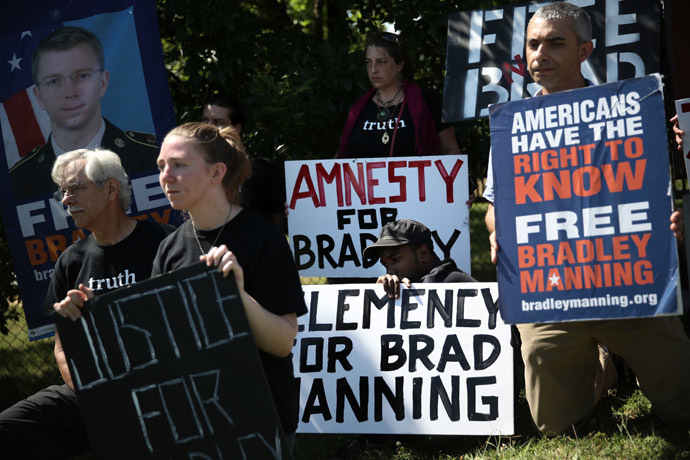Bradley Manning personally delivered a statement as his trial, which could see him convicted for up to 90 years in prison, nears its end. He defended leaking 700,000 US diplomatic cables as an act of conscience and apologized for the damage he caused.
The 25-year-old, who has already been convicted on 20 charges of espionage and theft, has not made a statement since a pre-trial hearing back in February.
Manning spoke for a brief two minutes, first apologizing to the court and acknowledging that by leaking the information to WikiLeaks he risked US security.
“First, your honor, I want to start off with an apology,” he said. “I’m sorry that my actions hurt people and I’m sorry that it hurt the United States. I understood what I was doing and the decision that I made. I’m sorry for the unintended consequences of my actions...When I made these decisions I believed I was going to help people, not hurt people."
Manning reiterated that he had been experiencing personal problems during his deployment and understands he will “have to pay a price for my decisions and actions.”
“How on Earth could I, a junior analyst, possibly believe I could change the world for the better over those with the proper authority?” he said. “I know that I can and will be a better person. I hope that you can give me the opportunity to prove, not through words but through conduct, that I can return to a productive place in society.”

WikiLeaks, the anti-secrecy group to which Manning leaked the cables, battlefield reports and a combat video, issued a statement Wednesday in response to Manning’s statement.
“The only currency this military court will take is Bradley Manning’s humiliation,” it read. “In light of this, Mr. Manning’s forced decision to apologize to the US government in the hope of shaving a decade or more off of his sentence must be regarded with compassion and understanding.
“Mr. Manning’s apology is a statement extorted from him under the overbearing weight of the US military justice system. It took three years and millions of dollars to extract two minutes of tactical remorse from this brave soldier,” the statement continued.
During the sentencing hearing, which decides the length of time the former intelligence analyst will spend behind bars, Manning had a choice of what type of statement he could have made. He was allowed to either testify as a witness, make an unsworn statement (his own version of the facts of his case that cannot be cross-examined) or a sworn statement, the likeliest to be challenged by the prosecutors.
MANNING: "When I made these decisions I believed I was going to help people, not hurt people."
— RT America (@RT_America) August 14, 2013
MANNING: "The last few years have been a learning experience." Said he should have worked more "inside the system"
— RT America (@RT_America) August 14, 2013
Throughout the sentencing hearings, Manning’s defense team have focused on their client’s psychological instability and gender identity confusion at the time of the leaks in 2010. A psychologist who spent time with Manning during his stint in Iraq testified earlier this week that the gay soldier struggled in a “hyper-masculine environment”.
Cpt. Moulton place gender identity disorder as primary disorder #Manning was dealing with. Abnormal personality traits secondary
— Kevin Gosztola (@kgosztola) August 14, 2013
Manning’s lawyers have argued that their client, who had already been in counseling over a range of minor issues, was allowed to access classified data while his mental state deteriorated.
The private previously said that he had become disillusioned with
the “capturing and killing” that dominated the US war on
the ground, which led him to hack into US diplomatic
communications network, and extract the classified cables, before
passing them onto Julian Assange’s Wikileaks website, which then
made them public.
Moulton: #Manning was really relying on morals and ideology -- stressors prevented him from seeing bigger picture
— Nathan Fuller (@nathanLfuller) August 14, 2013
Dr. Moulton said #Manning "was in an environment that really precluded him from talking about these desires," referring to gender issues.
— Andrew Blake (@apblake) August 14, 2013
While the cables did not contain the most confidential data exchanged by US officials, prosecutors say that the embarrassing revelations had a “chilling” effect on Washington’s relations with the rest of the world.
Manning was arrested in May 2010, and presiding Judge Lind has reduced his sentence by 112 days for the harsh treatment meted out upon his detention.
Bradley Manning is entitled to appeal against any verdict handed
to him by the court-martial in the Army Court of Criminal Appeal
within six months.
